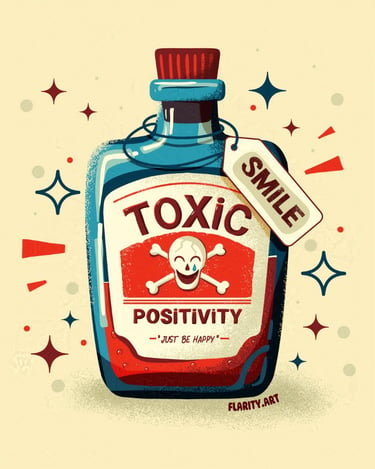Toxic Positivity: Recognizing and Overcoming Unrealistic Happiness
MINDSET & PERSONAL DEVELOPMENT
What is Toxic Positivity?
Hey there, fellow seekers of genuine well-being! Have you ever had a problem you chose to ignore, but it kept itching the back of your mind until it blew into a disaster?
In a world that often pressures us to "stay positive" and "look on the bright side," it’s easy to fall into the trap of toxic positivity. This phenomenon, while seemingly well-intentioned, can be detrimental to our mental health. And I am fairly confident that we all have fallen prey to it at least once.
Today, let's explore what toxic positivity is, why it’s harmful, and how we can embrace a more authentic approach to our emotions. Plus, I'll share three insightful books that delve into this topic.
Why Toxic Positivity is Harmful
Embracing Genuine Emotions
Book Recommendations on Toxic Positivity
Toxic positivity is the overgeneralization of a happy, optimistic state across all situations. It’s the limited belief that no matter how dire or difficult a situation is, people should maintain a positive mindset. While positivity can be beneficial, when it becomes excessive and dismisses real, negative emotions and refuses to look into a problem itself, it turns toxic.
Invalidates Real Emotions
Telling someone (or affirming it to yourself) to "just stay positive" or "look on the bright side" can invalidate genuine feelings of sadness, anger, or frustration. It suggests that the emotions are not valid or important, leading to feelings of shame and isolation. When people are not allowed to express their true feelings, they might suppress their emotions, which can lead to increased stress and emotional distress. Remember that the way you feel is always valid, no matter what others might tell you. Listen to your inner voice, and remember that each person you talk to has emotions of their own.
Suppresses Emotional Growth
When we constantly push away negative emotions, we miss the opportunity to process and learn from them. Emotions, both positive and negative, provide valuable information about our needs and experiences. By acknowledging and understanding our full range of emotions, we can develop emotional intelligence and resilience. Suppressing emotions can lead to unresolved issues, making it difficult to cope with future challenges. try meditation, journaling, therapy, or any method that lets you listen to your feelings rather than ignore them.
Creates Unattainable Standards
Toxic positivity sets unrealistic expectations that we should be happy all the time. That is one of the reasons why you should not compare yourself to the "happiness" of people online. Firstly, social media representation of someone's life is most probably fake. Secondly, this can lead to feelings of inadequacy when we inevitably experience negative emotions, as it’s a natural part of life. Believing that we must always be or [retend to be positive can create pressure and stress, leading to further emotional difficulties. It’s important to recognize that experiencing a range of emotions is a normal part of being human.
Allow Yourself to Feel
Give yourself permission to feel all your emotions without judgment. It’s okay to be sad, angry, or frustrated. It might not be easy and in some instances even painful, or you might not be the type of person who is comfortable to be one-on-one with yourself. Recognize these feelings as valid parts of the human experience. Allowing yourself to feel can lead to greater self-awareness and emotional healing.
Practice Self-Compassion
Be kind to yourself when you’re going through tough times. Self-compassion involves treating yourself with the same kindness and understanding you would offer a friend. It helps reduce negative self-talk and promotes emotional resilience.
Seek Support
Talk to trusted friends, family members, or a mental health professional about your feelings. Sharing your emotions can provide relief and help you gain new perspectives. It’s important to choose supportive and understanding individuals who can listen without judgment and offer comfort and guidance.
Find a Way to Listen to Yourself
It’s crucial to create a safe space where you can explore and express your emotions freely. You might already have a coming strategy for you to implement when feeling stressed, but it might not apply to healing toxic positivity. The key is not to avoid irrational anxiety by going to the gym or escaping hobbies but to look inwards. look into mindful activities such as shadow work journaling, therapy sessions with a professional, and guided meditation.
If you want to learn further the psychology behind toxic positivity and human behavior, here are three book recommendations to start with:
1. "The Happiness Trap: How to Stop Struggling and Start Living" by Dr. Russ Harris
This book explores the concept of Acceptance and Commitment Therapy (ACT), which encourages embracing all emotions rather than striving for constant happiness. It provides practical strategies to help readers live a more authentic and fulfilling life.
2. "Positivity: Top-Notch Research Reveals the Upward Spiral That Will Change Your Life" by Barbara Fredrickson
While this book emphasizes the benefits of positive emotions, it also acknowledges the importance of balancing positivity with a realistic understanding of life’s challenges. Fredrickson’s research-based insights help readers cultivate genuine positivity.
3. "Toxic Positivity: Keeping It Real in a World Obsessed with Being Happy" by Whitney Goodman
Whitney Goodman delves into the harmful effects of toxic positivity and offers practical advice for embracing authentic emotions. This book provides a comprehensive look at how to balance positivity with the reality of everyday struggles, promoting a healthier approach to mental well-being.
Toxic positivity can undermine our mental health by invalidating real emotions and setting unrealistic standards. By embracing our genuine feelings and practicing self-compassion, we can lead more authentic and fulfilling lives. If you’re interested in learning more about this topic, I highly recommend checking out the books mentioned above.
Remember, it’s okay to not be okay sometimes. Let’s strive for genuine emotional well-being rather than forced positivity. And if you’d like more insights on mental health and personal growth, don’t forget to subscribe to my newsletter!






